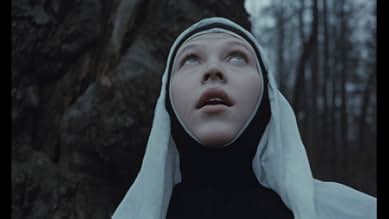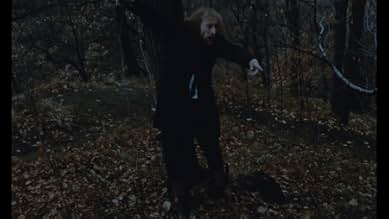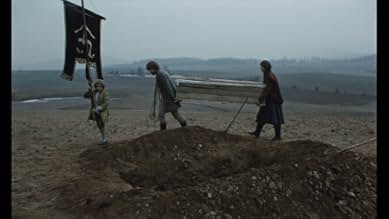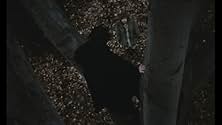IMDb RATING
7.0/10
3.3K
YOUR RATING
Young Polish noble Jakub, freed during 1793 Prussian invasion, experiences father's death, betrayal. Traumatized, he follows his savior, committing brutal murders across the country.Young Polish noble Jakub, freed during 1793 Prussian invasion, experiences father's death, betrayal. Traumatized, he follows his savior, committing brutal murders across the country.Young Polish noble Jakub, freed during 1793 Prussian invasion, experiences father's death, betrayal. Traumatized, he follows his savior, committing brutal murders across the country.
- Director
- Writer
- Stars
- Director
- Writer
- All cast & crew
- Production, box office & more at IMDbPro
Featured reviews
Depravity, violence, a world permanently tipped off balance.
Near the end our halfmad protagonist asks someone else if he sees the world ugly because of his illness or because it is. The other replies that the world is filled with beauty, flowers, fruit, women, then reasons that he cannot adequately describe it. Instead he will dance about it.
His dance is not beautiful though, it's a wild spasmodic flailing of arms like we're seeing an epileptic suffer a seizure.
Diabel is that dance.
Superficially an allegory on how revolutions become mired in distraction - the political hedonism of power? - and how Poland has been used and abused by so many, deeper we find the same frightful pantomime that made Possession such a terrifying beast: inner soul made visible.
Slight problem is that he does not abstract enough to hit that bedrock were every image becomes multi-layered utterance of different cosmii. Characters remain pieces of the allegoric jigsaw, pawns in a game. There is not enough emptiness from life to pour into.
Near the end our halfmad protagonist asks someone else if he sees the world ugly because of his illness or because it is. The other replies that the world is filled with beauty, flowers, fruit, women, then reasons that he cannot adequately describe it. Instead he will dance about it.
His dance is not beautiful though, it's a wild spasmodic flailing of arms like we're seeing an epileptic suffer a seizure.
Diabel is that dance.
Superficially an allegory on how revolutions become mired in distraction - the political hedonism of power? - and how Poland has been used and abused by so many, deeper we find the same frightful pantomime that made Possession such a terrifying beast: inner soul made visible.
Slight problem is that he does not abstract enough to hit that bedrock were every image becomes multi-layered utterance of different cosmii. Characters remain pieces of the allegoric jigsaw, pawns in a game. There is not enough emptiness from life to pour into.
I've always thought this film aimed to present, in a gothic key, a life lesson. When you grow older, you inevitably reach a point where you no longer recognize the world around you as the one you grew up with, or it no longer reflects the idea you had of it. You realize you've been living in an idealized dimension-like finding out your mother is a prostitute, your father raped your sister, and your former best friend would never have missed a chance to steal your girlfriend. You want to erase everything that doesn't match your vision of the world in order to purify it (this could be, for instance, younger people following fashions you can't understand, or moral paradigms that are shifting). But in truth, you don't hate others-you hate the discomfort you feel in a world you can no longer engage with; you want to erase yourself (as happens to Jakub). In this dynamic, you end up listening only to instinct, to the irritation and unease you feel, because it's so overwhelming that you can't listen to anything else. Your conscience is left impaled and shocked before your own actions.
Well, i went into this completely blind. Had no clue this movie existed. I can tell you that this movie is really hard to follow. I wanted to watch this with subs from my country, but sadly i found it only with English subs, so it was really, REALLY hard to follow. But what i followed was pretty good.
This movie never got boring, maybe a tiny bit, but for the most part it's really sharp. I can tell you that the movie has a clear message: A King that's being influenced with God and Evil. The King (who was said to be mentally ill at times, not 100% sure bout that), only followed the Diabel, while the Nun the Good, he just ignored her, and she was there for nothing.
This movie depicts in a very brutal, way how it is to be forgotten. This King has been sentenced to death, and when he escaped, nobody really cared for him: His wife re-married, his mother is a prostitute, his sister barely cared, it's like when you get locked up for such a long time, when people forget about you, they just dont care anymore.
Also, what we forget, is how many people have been killed because of the Diabel, even though these people did not care, the King killed people that nothing to do with being forgotten, like the Turkish woman, and the other actor... He killed people that had nothing to do with this, and then he Diablo forced him into self destruction, untill in the end, when the Devil shows it's true face.
This is an amazing movie, i actually wanted to give it 10/10, but it's just too difficult to follow. I think this movie was inspired based on 1971 The Devils, they seem kinda similar, and i loved 1971 The Devils, this is kinda in the same boat. I think this is the first movie ive seen from Poland, and it's worth watching.
I enjoyed what was served, even though i think i didn't pick up on a lot of what was being said, but still pretty well made movie for what it is. A lot of people are complaining over bad acting, and bad "directing". No, to everything seemed to work pretty well. And as i say 100 times, the MOST important thing when it comes to movies, is the plot, this had a strong plot, and i enjoyed it.
This movie never got boring, maybe a tiny bit, but for the most part it's really sharp. I can tell you that the movie has a clear message: A King that's being influenced with God and Evil. The King (who was said to be mentally ill at times, not 100% sure bout that), only followed the Diabel, while the Nun the Good, he just ignored her, and she was there for nothing.
This movie depicts in a very brutal, way how it is to be forgotten. This King has been sentenced to death, and when he escaped, nobody really cared for him: His wife re-married, his mother is a prostitute, his sister barely cared, it's like when you get locked up for such a long time, when people forget about you, they just dont care anymore.
Also, what we forget, is how many people have been killed because of the Diabel, even though these people did not care, the King killed people that nothing to do with being forgotten, like the Turkish woman, and the other actor... He killed people that had nothing to do with this, and then he Diablo forced him into self destruction, untill in the end, when the Devil shows it's true face.
This is an amazing movie, i actually wanted to give it 10/10, but it's just too difficult to follow. I think this movie was inspired based on 1971 The Devils, they seem kinda similar, and i loved 1971 The Devils, this is kinda in the same boat. I think this is the first movie ive seen from Poland, and it's worth watching.
I enjoyed what was served, even though i think i didn't pick up on a lot of what was being said, but still pretty well made movie for what it is. A lot of people are complaining over bad acting, and bad "directing". No, to everything seemed to work pretty well. And as i say 100 times, the MOST important thing when it comes to movies, is the plot, this had a strong plot, and i enjoyed it.
Andrzej Zulawski's 'The Devil' is a real oddity from the early 1970s. Originally released in 1972, but banned at the behest of the Catholic church, it has been little seen, which is a pity, because it is a fascinating movie that deserves a larger audience. Reminiscent at times of Jodorowsky and sometimes Fellini, this is a very puzzling movie steeped in religious symbolism.
In 18th Century Poland the Prussian army are in the process of conquering the country. In the midst of this chaos a mysterious figure arrives at a convent with orders to escort a political prisoner. The prisoner, a young man named Jakub, was accused of attempting to murder the King. The man finds Jakub, and along with a young nun they flee the oncoming troops. Once they are safe Jakub is freed and urged to return home. When he arrives he finds that nothing is as before. His father burnt down the family home before committing suicide, his pregnant fiancee has married one of his friends, and his mother is a whore. Jakub is constantly described by others as being a lunatic or "sick" yet in many ways he appears to be the sanest one of the lot. To complicate matters the man who initially rescued him shadows his every move and seems to have a strange agenda of his own. Is Jakub mad or is the world? Who is the enigmatic stranger and what does he want of Jakub? 'The Devil' will appeal to fans of strange, multi-layered movies.
In 18th Century Poland the Prussian army are in the process of conquering the country. In the midst of this chaos a mysterious figure arrives at a convent with orders to escort a political prisoner. The prisoner, a young man named Jakub, was accused of attempting to murder the King. The man finds Jakub, and along with a young nun they flee the oncoming troops. Once they are safe Jakub is freed and urged to return home. When he arrives he finds that nothing is as before. His father burnt down the family home before committing suicide, his pregnant fiancee has married one of his friends, and his mother is a whore. Jakub is constantly described by others as being a lunatic or "sick" yet in many ways he appears to be the sanest one of the lot. To complicate matters the man who initially rescued him shadows his every move and seems to have a strange agenda of his own. Is Jakub mad or is the world? Who is the enigmatic stranger and what does he want of Jakub? 'The Devil' will appeal to fans of strange, multi-layered movies.
Along with "The Silver Globe", this is my favorite Zulawski film. Why? Well, maybe because both of them are so utterly insane. Zulawski is hardly known here in the states, and the only film of his that is available domestically (thanks to Anchor Bay) is "Possession". Sad really but that's life. As the saying goes, the depth of an idea is inversely proportional to the mass perception. It isn't the case for many famous artists of course, but for Zulawski it rings true. I haven't seen any of the stuff he made while living in France (I understand that many of them are on the more erotic side of things) with the exception of the above-mentioned "Possession" and "The Importance of Love" (with Romy Schneider and Fabio Testi), which was definitely *something". I also watched Zulwaski's later effort "Szamanka" which I have no comment on because I viewed a bootleg copy in Polish with French subtitles, and I speak neither of the languages. The same basically goes for "The Silver Globe" actually, which, as far as I know, can only be seen in Polish with German subtitles. But damn it, this film (which was never even finished) was nuts with or without English subtitles. And so is "Diabel". which I was lucky enough to find WITH the English subs! Hooray!!! Why this movie scared both the erstwhile Polish communist authorities, who were highly confused by it and suspected that it carried hidden anti-government messages, and the Catholic Church, which was completely outraged for reasons quite obvious if you've seen the film, much more so than the secular authorities, is clear even thirty something years (made around 1972 and then shelved by the censors until the late 80's) after it was made. Human insanity, cruelty and depravity are all here on display, wrapped in a guise of a historical epic and punctuated by Zulawski's trademark chaotic camera work and overall delivery. Is the film excessive and gratuitously shocking? Yes! But why shouldn't it be? Zulawski was young (and surely angry) back then, and the things he was going up against were, still are, and have always been a thousand times more excessive. If you can't take it - oh well. Maybe you should pull the wool off your eyes and look around. Another reason why I chose "Diabel" and "The Silver Globe" as favs is because of the time and place. They were made in the then Eastern Block during the Cold War and on the director's native soil, which must count for something, right? - all of which might have(or not) added more poignancy to the films (don't tell that to Roman Polanski though).After you move to France, the Artist's paradise that it is, it becomes safe for you to do what you do. The chance to suffer for your art diminishes significantly. Although, of course, you could suffer financially instead, which is something many Eastern European film makers discovered after the ascent of the market economy. Then again, in the new world disorder things change rather quickly. The recent slaying of a Dutch film director (Theo van Gogh was his name, I believe) by Muslim extremists shows that an artist in need can still fully suffer if he wants to. Anyway, back to "Diabel" - I love it. It's not something to be taken lightly of course. As a friend of mine wistfully observed: "the scene where a guy gets shot in the face is one of the most memorable I've seen in any film. So jarringly sudden, I was literally shocked - I don't know why it affected my like that." And I suppose I'll just leave it at that. I mean, how often does that happen in this day and age? Blessed be the sick! Amen.
Did you know
- TriviaThe film was banned in communist Poland.
- ConnectionsFeatured in Brows Held High: Häxan (2012)
- How long is The Devil?Powered by Alexa
Details
Contribute to this page
Suggest an edit or add missing content





























